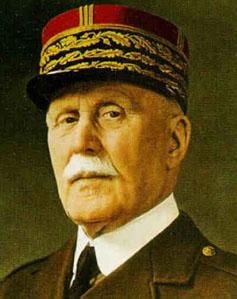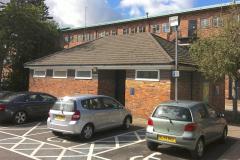
Disturbing events in the French army meant that they were not involved in widespread and sustained attacks during May. Indeed Nivelle's plans for a speedy "rupture" of the German lines on the Chemin des Dames produced only appalling casualties (130,000 in a matter of days) and widespread disillusionment. Faced with fighting in atrocious weather against the strongest defences on the Western Front, French morale began to crumble. Discontent among "les poilus" focussed on the seemingly pointless offensives, the atrocious conditions in the trenches, poor food and lack of leave. Sixty-eight of the 132 divisions were affected. There was no violence against junior officers, who were well respected for sharing in the hardships and the short-lived indiscipline usually took the form of a refusal to attack. The lines, however, were maintained.
Faced with the need to restore order, the French authorities turned again to Pétain, who replaced Nivelle on 15th May. Pétain was known to be more 'economical' with men's lives. He made several changes. Provisions were improved (especially the pinard or wine), regular leave was introduced along with a speedier rotation of units on the Front Line. There was also a shift to defence in depth. Mass sacrificial attacks were abandoned. However, as a result of the mutiny, 3,335 soldiers were court martialled and 449 men were condemned to death (although only 27 were actually shot). Secrecy, amazingly was maintained - the Germans knew nothing of the widespread combat refusals. However, the immediate burden now fell upon the British Empire. The third battle of the Scarpe river and Bullecourt began on the 2nd of the month. Scarpe soon petered out but Bullecourt lasted until the 17th. Altogether the actions around Arras cost the enemy 130,000 casualties and we lost nearly 160,000 including 3 local men.
The first of these Rifleman Harold Worsley of the 1st battalion Rifle Brigade (S/13602) died on the 4th, aged 21. He is commemorated on the civic memorial and in St Bart's, and is interred in Duissans British Cemetery, Etrun, 9 km west of Arras. He was the son of Herbert and Mary (née Shuttleworth) of West View Terrace and in 1911 was a newspaper errand boy. He had 3 sisters and 7 brothers one of whom John, was to die on the Western Front in the Kaiserschlacht offensive in March 1918. His mother had also lost a nephew, Private Frank Shuttleworth in May 1915 near Armentières.
Feuchy British Cemetery Wancourt, 5 km east of Arras contains the grave of Bombadier Arthur Townsend of the Royal Field Artillery, who died on the 11th, aged 32. He was the son of Elizabeth and the late Joseph of Lichfield, Staffordshire. In 1901 he was a servant along with 18 others in a large country house, Lutwych Hall in Ruchberry St Peter, Church Stretton. Previous to this he had worked in Freeford Manor, near Lichfield. Arthur was married to Gertrude of 3 Lindow Terrace and is remembered in St John's, Lindow.
Both of the large houses in which Arthur had worked became auxiliary hospitals run by the Red Cross and the Voluntary Aid Detachment. Such institutions voluntarily given and supported (3,000 in all) housed the less severely wounded during the Great War. The first military hospital in Wilmslow was "Beechfield" on the corner of Albert Road and Alderley Road. Formerly a girls school it had a small permanent staff, volunteer nurses (at first usually middle and upper class girls) and 4 local GPS, who lived in adjoining streets. It was succeeded in December 1915 by the larger premises at the Rectory on Station Road plus a smaller establishment "Sunnyside" in Fulshaw Park (now Westgate).
Lance Corporal Fred Potts was the last young man from the community to die this month, he was aged 23. Fighting with the 12th battalion Royal Scots (27201) he was severely wounded in the first battle of the Scarpe. He was returned home but died here on the 17th. He was the son of Luke and Elizabeth of Poplar Farm, Newgate, Lindow Common and worked on the golf course before the war. Remembered on the town memorial, at Morley and in St Bart's, he is buried in Lower Withington Wesleyan Methodist Chapelyard, near Jodrell Bank Observatory.
Away from the battlefield, the Compulsory Service Act was introduced in the USA and Major General John Pershing was appointed Commander in Chief of the Expeditionary Force.
Clearly much was to change again in the coming months.
Jon Armstrong and Alan Cooper
Wilmslow Historical Society
with a contribution from Ray Acton
Photo: Marshall Philippe Pétain.








